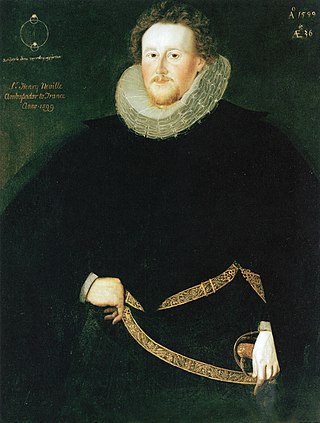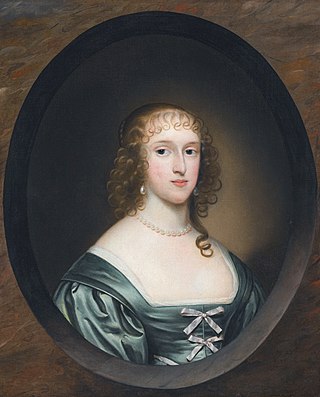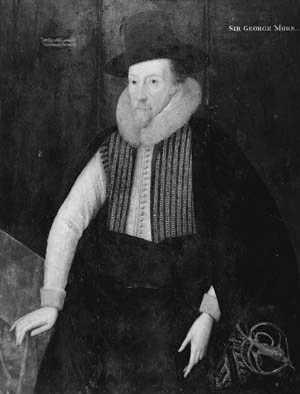
Sir Henry Neville was an English courtier, politician and diplomat, noted for his role as ambassador to France and his unsuccessful attempts to negotiate between James I of England and the Houses of Parliament. In 2005, Neville was put forward as a candidate for the authorship of Shakespeare's works.
William Strachey was an English writer whose works are among the primary sources for the early history of the English colonisation of North America. He is best remembered today as the eye-witness reporter of the 1609 shipwreck on the uninhabited island of Bermuda of the colonial ship Sea Venture, which was caught in a hurricane while sailing to Virginia. The survivors eventually reached Virginia after building two small ships during the ten months they spent on the island. His account of the incident and of the Virginia colony is thought by most Shakespearean scholars to have been a source for Shakespeare's play The Tempest.
Sir Henry Neville of Billingbear House, Berkshire, was a Gentleman of the Privy Chamber to King Henry VIII.
Sir William Armine, 1st Baronet was an English politician who sat in the House of Commons at various times between 1621 and 1651. He supported the Parliamentary cause in the English Civil War.
Sir Thomas Bowyer, 1st Baronet was an English politician who sat in the House of Commons at various times between 1614 and 1642. He supported the Royalist cause in the English Civil War.
Sir Richard Onslow was an English politician who sat in the House of Commons at various times between 1628 and 1664. He fought on the Parliamentary side during the English Civil War. He was the grandson of one Speaker of the House of Commons and the grandfather of another, both also called Richard Onslow.
Edward Alford was an English landowner and politician who sat in seven parliaments in the House of Commons between 1604 and 1628.

Sir Thomas Jermyn (1573–1645) of Rushbrooke, Suffolk, was an English Royalist soldier and politician who was a Member of Parliament between 1604 and 1640. He became an influential courtier and served as Comptroller of the Household to Charles I from 1639 to 1641.

Sir Edmund Bowyer was an English politician who sat in the House of Commons from 1660 to 1679.
Sir Samuel Owfield (1595–1644) was an English politician who sat in the House of Commons at various times between 1624 and 1644.
Sir Poynings More, 1st Baronet (1606–1649) was an English politician who sat in the House of Commons at various times between 1624 and 1640.

Sir George More was an English courtier and politician who sat in the House of Commons at various times between 1584 and 1625.
Sir Henry Crofts was an English politician who sat in the House of Commons at various times between 1624 and 1660.
Sir Thomas Copley (1534–1584) was a prominent English Roman Catholic politician and exile of the reign of Elizabeth I. Knighted, perhaps by the king of France, and created ennobled by Philip II of Spain, he was often known by contemporaries as "Lord Copley".
Sir Richard Spencer was an English nobleman, gentleman, knight, and politician who sat in the House of Commons from 1621 to 1629 and in 1661. He supported the Royalist cause in the English Civil War.
Sir John Shurley was an English politician who sat in the House of Commons in 1625.
Thomas Saunders was an English politician.
Thomas Bishop was an English politician who was a Member of the Parliament (MP) for Gatton in 1542.
Sir Robert Drury of Hedgerley and Chalfont St Peter, Buckinghamshire, was the second son of Sir Robert Drury, Speaker of the House of Commons, and was the father of Sir Robert Drury (1525–1593), Sir William Drury, and Sir Drue Drury.
Sir Matthew Browne of Betchworth Castle, Surrey, MP, was the only son of Sir Thomas Browne and Mabel Fitzwilliam. He was involved in legal and financial transactions concerning the Globe Theatre in 1601. He was killed in a duel with his kinsman, Sir John Townshend, on 1 August 1603.




